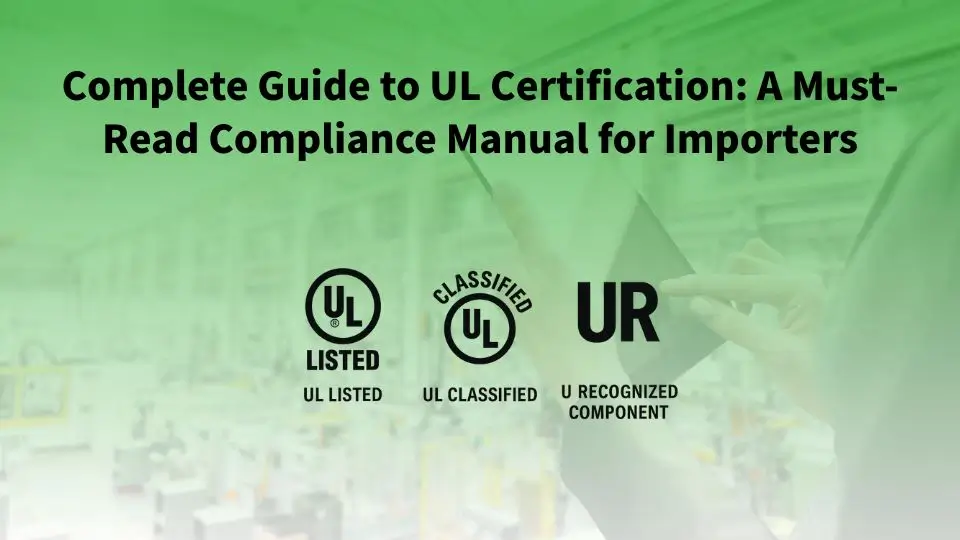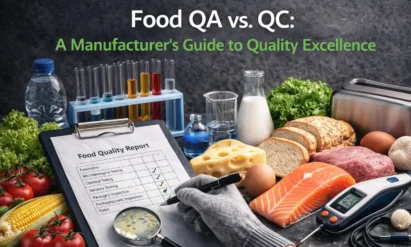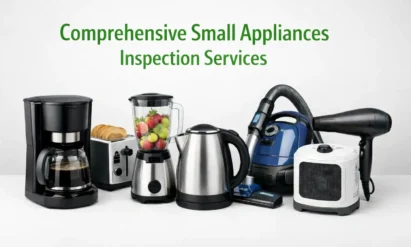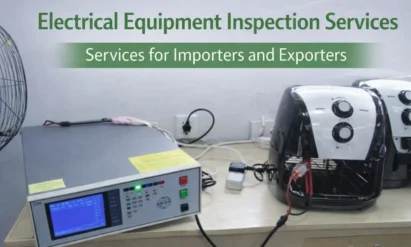Complete Guide to UL Certification: A Must-Read Compliance Manual for Importers
Jul 01,2025
Whether you are importing appliances, machinery or consumer electronics, UL certification is a critical aspect that you need to pay close attention to. UL, or Underwriters Laboratories, is one of the most recognised and respected organisations in product safety testing and certification.
For importers, understanding UL certification is critical not only for compliance but also for market access and consumer trust.
This guide will walk you through the basics of UL certification, its importance, the steps to obtain UL certification, and its impact on your import business.
Why is UL Certification Important?
UL provides independent verification that products meet strict safety standards. While UL certification is not a legal requirement, it is often a de facto requirement in the market – many retailers, regulators and even consumers rely on it.
For importers, UL certification means
- Products have been rigorously tested and meet established safety benchmarks.
- Reduced liability and risk of recalls or accidents.
- Increased credibility and consumer trust.
- Expanded access to the North American market.
In short, UL certification is more than just a badge, it is a market pass that can help companies build a good reputation.
How Does UL Work?
UL operates as a global independent safety science company. Its core responsibilities include:
- Developing safety standards across industries.
- Testing product samples against these standards in its own or authorised labs.
- Certifying products that meet requirements.
- Conducting unannounced factory audits(Follow-Up Services) to ensure ongoing compliance.
This process ensures products are not only safe when tested but also consistently safe in mass production.
Types of UL Certification
UL provides several certification types to suit different scenarios:
- UL Listed: For complete, stand-alone products that have been fully tested (e.g., appliances, industrial machines).
- UL Classified: The product meets UL standards for specific attributes or limited applications (e.g., fire resistance).
- UL Recognised Component: Applies to components (not finished products) that meet safety requirements when used within a larger system (e.g., power supplies, relays).
- UL Performance Verified: Indicates a product has been verified for specific performance metrics.
- System & Process Certifications: For management systems or manufacturing processes (similar to ISO standards).
Steps to Get UL Certified
To obtain UL certification, first identify the applicable standard for your product by determining if it falls under a UL-certifiable category. Next, apply to UL by submitting your product details and requesting a quotation. Then, submit product samples for testing according to the relevant standards. If the testing passes, UL will conduct a factory audit to inspect your manufacturing facility. Once approved, you’ll receive authorization to use the UL mark on your product. Lastly, UL will conduct periodic follow-up inspections to ensure your manufacturing facility remains in compliance with the required standards.
What Is a “UL Recognized Component”?
These components are designed to be integrated into a final product, such as internal power supplies or insulation materials. Although they are not directly marketed to consumers, they play a crucial role in accelerating the overall product certification process since they have already met essential safety standards.
UL Recognized components usually feature a “UR” mark and are primarily used in business-to-business (B2B) contexts to enhance confidence throughout the supply chain.
What Certification Services Does UL Provide?
UL offers services including
- Product safety certification.
- Management system certifications (quality, sustainability, food safety).
- Component recognition.
- Performance verification.
- Consulting and training.
- Factory audits and follow-ups.
Their services cover not just products, but also the broader ecosystem of manufacturing, processes, and compliance assurance.
UL Recognised vs. UL Listed: What’s the Difference?
| UL Listed | UL Recognised Component |
| For finished products | For components/parts |
| Visible to consumers | Not consumer-facing |
| Rigorous full-product testing | Limited-scope testing within systems |
| Example: A microwave | Example: A microwave’s power board |
Essentially, UL Listing applies to the final product and UL Recognition applies to the internal parts.
What Are the Requirements for UL Certification?
To pass UL certification, products must fall under a valid UL category, meet the applicable UL standards, and pass physical testing in a laboratory. They must also allow for factory inspections, use UL marks correctly, and maintain compliance over time. If products undergo significant changes after certification, retesting may be required to ensure continued compliance.
FAQs About UL Certification
Is UL certification legally required?
Usually not by federal law, but local regulations, retailers, and insurers often demand it.
How long does it take?
It varies. A simple product might take a few weeks. Complex products can take several months, especially if redesigns are needed.
What does UL certification cost?
Costs depend on the type of product, test scope, and audit needs. Basic certifications might cost a few thousand dollars; more complex cases, tens of thousands.
How can I verify if a product is UL certified?
Check the UL mark on the product and use UL’s Product iQ database to confirm its certification file.
Does UL certification expire?
It doesn’t expire by date but is contingent on passing regular follow-up audits. If you stop production or fail inspections, certification can be revoked.
What about Amazon and e-commerce platforms?
Yes, Amazon, for example, requires UL certification for certain electronics categories. Without it, your listing may be blocked.
Conclusion
UL certification is essential to ensure product safety and build trust in the U.S. and global markets. For importers, it is more than just compliance; it is a sign of professionalism, reliability and long-term competitiveness.
Rather than viewing certification as a cost, think of it as an investment in safety, brand reputation and customer trust.
--- END ---
Products
Get A Free Quote
Related Blogs
QCC SAMPLE REPORT
For sample reports or custom checklists, please contact us – we're here to assist you.



 December 31,2025
December 31,2025

